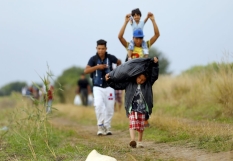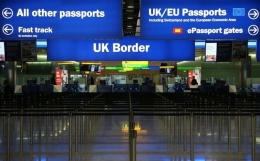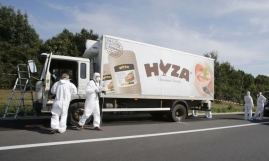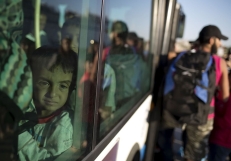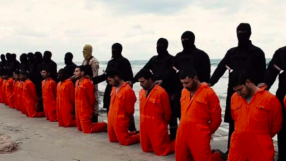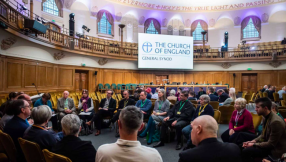European Union ministers were summoned on Sunday to meet in two weeks' time to seek urgent solutions to a migration crisis unprecedented in the bloc's history, as the mounting death toll on land and sea forced governments to respond.
Luxembourg, which holds the rotating EU presidency, called interior ministers from all 28 member states to an extraordinary meeting on September 14, saying: "The situation of migration phenomena outside and inside the European Union has recently taken unprecedented proportions."
Chancellor Angela Merkel earlier called on her EU neighbours to do more as Germany expects the number of asylum seekers it receives to quadruple to about 800,000 in 2015.
"If Europe has solidarity and we have also shown solidarity towards others, then we need to show solidarity now," she told reporters in Berlin. "Everything must move quickly."
Luxembourg said the meeting would focus on policies on sending some migrants home and measures to prevent human trafficking.
Seven people died when their boat sank off Libya's coast on Sunday, the second such fatal accident at sea within days. The Italian coastguard said some 1,600 migrants had been rescued in the Mediterranean and brought to Italy over the weekend.
At least 2,500 migrants have died since January, most of them drowning in the Mediterranean after arduous journeys fleeing war, oppression or poverty in Syria and other parts of the Middle East and Africa or beyond.
The horrors faced by migrants were brought to the heart of the European mainland on Friday when 71 bodies, including those of a baby girl and three other children were found in an abandoned refrigeration truck in Austria.
The dead, believed to be refugees from Syria or possibly Afghanistan, had been packed into the truck with just one square metre (10 sq ft) of space per five people, police said on Sunday, as initial forensic tests indicated they had suffocated.
Hungarian police arrested a fifth suspect, a Bulgarian citizen, in connection with the deaths. Three Bulgarians and one Afghan had already been arrested.
Borderless system
Criticism of Europe's disparate laws and approaches to dealing with asylum seekers has mounted.
Some governments have refused to take in refugees and resisted EU proposals to agree on a common plan. Others are toughening their asylum policies and border security, sometimes because of rising anti-immigration and nationalist sentiment.
French Foreign Minister Laurent Fabius accused eastern European states, notably Hungary, which is building a fence against migrants along its border, of a "scandalous" policy.
"They are extremely harsh. Hungary is part of Europe, which has values and we do not respect those value by putting up fences," Fabius told Europe 1 radio.
But British interior minister Theresa May blamed Europe's borderless system for fuelling the crisis and demanded tighter EU rules on free movement.
"When it was first enshrined, free movement meant the freedom to move to a job, not the freedom to cross borders to look for work or claim benefits," May said. "We must take some big decisions, face down powerful interests and reinstate the original principle."
Some European governments are considering amending the Schengen code, but the European Commission, the EU executive which enforces it, says there is no need to change the rules, either to improve security or control migration.
In Italy which as the entry point for many migrants has been at the forefront of the crisis, Prime Minister Matteo Renzi said the rising death toll would push EU states to confront the problem.
"It will take months, but we will have a single European policy on asylum, not as many policies as there are countries," he said.










